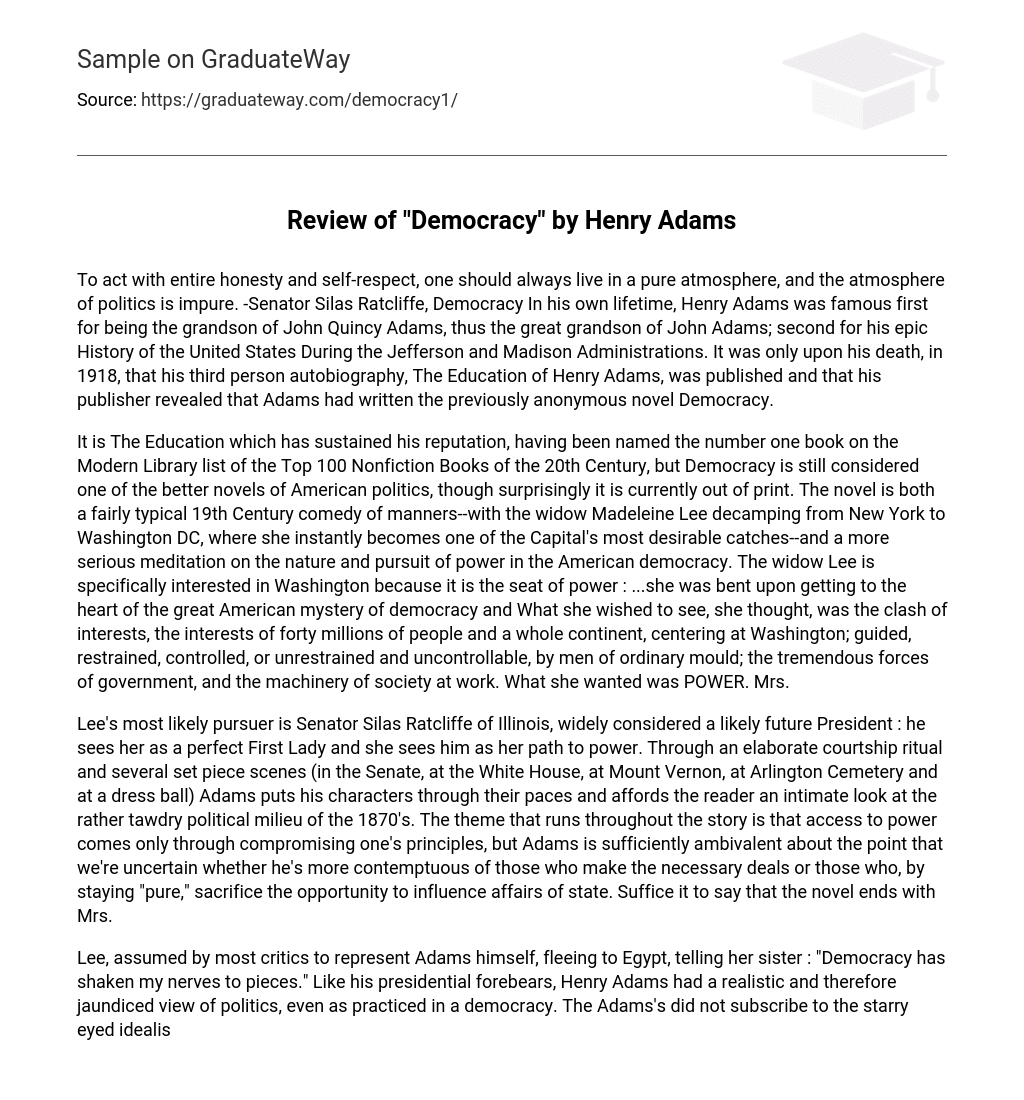To act with entire honesty and self-respect, one should always live in a pure atmosphere, and the atmosphere of politics is impure. -Senator Silas Ratcliffe, Democracy In his own lifetime, Henry Adams was famous first for being the grandson of John Quincy Adams, thus the great grandson of John Adams; second for his epic History of the United States During the Jefferson and Madison Administrations. It was only upon his death, in 1918, that his third person autobiography, The Education of Henry Adams, was published and that his publisher revealed that Adams had written the previously anonymous novel Democracy.
It is The Education which has sustained his reputation, having been named the number one book on the Modern Library list of the Top 100 Nonfiction Books of the 20th Century, but Democracy is still considered one of the better novels of American politics, though surprisingly it is currently out of print. The novel is both a fairly typical 19th Century comedy of manners–with the widow Madeleine Lee decamping from New York to Washington DC, where she instantly becomes one of the Capital’s most desirable catches–and a more serious meditation on the nature and pursuit of power in the American democracy. The widow Lee is specifically interested in Washington because it is the seat of power : …she was bent upon getting to the heart of the great American mystery of democracy and What she wished to see, she thought, was the clash of interests, the interests of forty millions of people and a whole continent, centering at Washington; guided, restrained, controlled, or unrestrained and uncontrollable, by men of ordinary mould; the tremendous forces of government, and the machinery of society at work. What she wanted was POWER. Mrs.
Lee’s most likely pursuer is Senator Silas Ratcliffe of Illinois, widely considered a likely future President : he sees her as a perfect First Lady and she sees him as her path to power. Through an elaborate courtship ritual and several set piece scenes (in the Senate, at the White House, at Mount Vernon, at Arlington Cemetery and at a dress ball) Adams puts his characters through their paces and affords the reader an intimate look at the rather tawdry political milieu of the 1870’s. The theme that runs throughout the story is that access to power comes only through compromising one’s principles, but Adams is sufficiently ambivalent about the point that we’re uncertain whether he’s more contemptuous of those who make the necessary deals or those who, by staying “pure,” sacrifice the opportunity to influence affairs of state. Suffice it to say that the novel ends with Mrs.
Lee, assumed by most critics to represent Adams himself, fleeing to Egypt, telling her sister : “Democracy has shaken my nerves to pieces.” Like his presidential forebears, Henry Adams had a realistic and therefore jaundiced view of politics, even as practiced in a democracy. The Adams’s did not subscribe to the starry eyed idealism of the Jeffersonians. But they were all drawn to politics, even realizing that it was a moral quagmire.
This is the fundamental dilemma of the conservative democrat, we recognize that we have to govern ourselves because we know we can’t trust unelected rulers, but we also understand that our elected representatives are unlikely to be any more honest than the tyrants we threw out. This attitude is famously captured in Winston Churchill’s (alleged) aphorism : “Democracy: the worst of all possible systems, but there is no other which would be better.” And the unfortunate corollary is that unless relatively honorable men like the Adamses and the Churchills pursue careers in politics, the field will be left to the real scoundrels. Henry Adams doesn’t offer any solutions to the dilemma, but he offers an amusing take on it.
henry Adams. democracy





